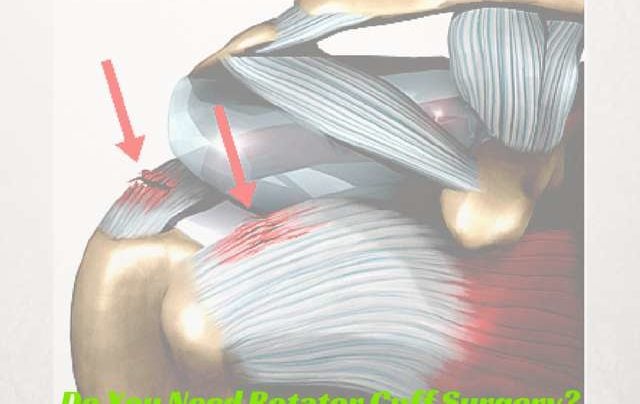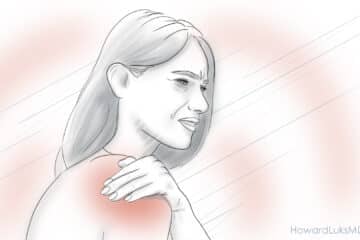
Rotator cuff surgery involves stitching or reattaching your torn rotator cuff tendon back to the humerus. The surgery to repair your rotator cuff is performed arthroscopically or with a small camera and other small incisions. With modern techniques rotator cuff surgery has become relatively easy to perform for Orthopedic Surgeons who specialize in shoulder injuries. But, this begs this question… do all rotator cuff tears require rotator cuff surgery? The answer might surprise you.
Whether or not you should consider rotator cuff surgery depends on a number of factors:
- your age
- the cause of your rotator cuff tear
- traumatic
- no injury
- the size of your tear
- if you have failed a trial of non-surgical management.
- physical therapy
- injections
- anti-inflammatory medications
This post and the answers below by our five Orthopedic Surgery experts deals with the topic of degenerative rotator cuff tears. That means that your rotator cuff wore out. If you had a severe injury which caused your rotator cuff tear, then I suggest you read this post. Rotator cuff surgery is usually recommended for nearly all traumatic tears.
Degenerative rotator cuff tears are very common. Many of you will not recall having an injury. You simply noticed your shoulder hurt one day. Some of you may have felt a snap while lifting up something like a suitcase. These are all common presentations for patients with degenerative rotator cuff tears. Many small degenerative rotator cuff tears will not require rotator cuff surgery. After 40, many people will have a rotator cuff tear and not even know it. You may wish to review our first Expert Series post where we discussed the cause of rotator cuff tears.
Remember:
- The rotator cuff is the most likely source of pain after 30
- Most rotator cuff issues, including tears are due to degeneration or attrition
- Most patients with small degenerative rotator cuff tears can be treated without surgery.
- Surgery for degenerative rotator cuff tears is generally considered after failure of a non-surgical regimen of physical therapy, possible injections and oral medications.
As accomplished shoulder surgeons, when do we consider rotator cuff surgery for a small degenerative rotator cuff tear?
Our Expert Series continues today with an answer to your question:
Do I Need Rotator Cuff Surgery?
Derek Ochiai, MD: Website, Twitter
Surgery is an option for degenerative rotator cuff tears that fail to respond adequately to non-surgical treatment, such as physical therapy and cortisone injections. Also, if the rotator cuff tear is inhibiting the patient’s quality of life.
Scott Slattery, MD: Website, Twitter
There are many options for the treatment of a small degenerative rotator cuff tear. I give all patients with small degenerative tears the option to treat them non-surgically with anti-inflammatory medications as well as physical therapy to improve flexibility, strength, muscle balance and coordination. This can work quite well. If the patient has good function and minimal pain, surgery is not absolutely required. If the tear is degenerative, chronic and large with associated muscle atrophy, initial non-surgical treatment with oral medications, injections and physical therapy is almost always the best option.
Marty Leland, MD: Twitter, Facebook
When I first see a patient over 40 with shoulder pain, my first treatment is anti-inflammatories, physical therapy, and frequently a subacromial steroid injection. I will then see the patients back 6-8 weeks later. If they are much better, there is no need for any further treatment. If they aren’t much better, I get an MRI to evaluate their rotator cuff. I usually do not order an MRI the first time I see them because, even if they do have a small rotator cuff tear, I would like to see if non-operative treatment would help them. If it does, GREAT! They may have avoided a surgery. I only order MRIs if they aren’t getting better. However, if I have a patient with a long history of shoulder pain and weakness and they are very weak on examination, I sometimes do order an MRI after the first office visit.
Jeffery Berg, MD: Website, Twitter
Do you have questions regarding an Orthopedic injury or longevity?
Do you want to talk to an expert who can listen to you for 45-60 minutes and explain the options in detail?
Dr. Howard Luks offers remote guidance sessions to review your X-ray or MRI images and explain your options.
Dr. Luks has also received hundreds of requests for educational sessions on the topics discussed in his book, Longevity Simplified.
Degenerative rotator cuff tears are extremely common. Often these tears can be asymptomatic and incidentally diagnosed. So the first component of my “treatment” for these tears is to determine if they are symptomatic or not. If not felt to be symptomatic, I direct my treatment towards the suspected source of the patient’s symptoms and I advise observation of the tear. The observation primarily consists of clinical evaluations (history and exam) yearly if they remain asymptomatic or sooner if symptoms worsen, since these tears can progress and that progression usually is associated with an increase in symptoms. Depending on the office evaluation, I might also suggest serial ultrasounds or MRIs to evaluate for progression.
If these tears are felt to be symptomatic, I typically will start with nonoperative treatment. I find this to be the most reasonable treatment as degenerative tears often respond favorably to “conservative care” and although the symptoms can often respond well to surgery, they often don’t fully heal following the surgery. My nonoperative treatment consists of oral anti-inflammatories to treat the frequently associated bursitis as well as the pain that often brings the patient to the office. I will almost always include physical therapy as there usually is associated shoulder dysfunction and finally I suggest avoiding aggravating activities. Typically, I try this for 4-6 weeks, looking for any improvement. If improvement is seen, I will suggest continued nonoperative treatment until symptoms resolve or stabilize at an unacceptable level. If the latter, I will recommend an arthroscopic repair. If there is some retraction (lateral to mid humeral head) seen on the MRI, and depending on some specific patient characteristics (ie. young health, high activity level, etc.), I may suggest surgery on initial diagnosis, as I am concerned that if there is any further retraction, the tear may become unrepairable.
How we as physicians manage certain injuries may not always seem logical to patients. Many will not understand why we do not MRI every painful joint and many do not understand why we do not need to operate on everything that is “torn”. It is our obligation to educate you.
Our last post … When Should We MRI Your Shoulder will help you understand that we can make a reasonably good diagnosis and establish a treatment plan that should work without expensive, time-consuming imaging. In addition, many of our parts wear out. Like your favorite pair of jeans … Not all rotator cuff tears require rotator cuff surgery. The American Academy of Orthopedic Surgeons produced a document to assist surgeons in evidence-based management of rotator cuff tears. In this document, they find limited evidence to support surgery for degenerative rotator cuff tears without a trial of non-surgical management first. That said, some rotator cuff tears might continue to hurt after nonsurgical treatments … and you might be offered surgery as an option to improve your pain and thus your quality of life.













Jody
Lymphedema is a common problem among those with more advanced breast cancer. I am concerned that what could be managed pre-op breast CA surgery is not being addressed. Should the rotator cuff degenerate further, I will have to live with it indefinitely. Breast cancer patients avoid any invasive procedures on the operative side. This includes anything that might otherwise seem mild, such as needle sticks. I do appreciate you taking the time to answer. Thank you.
Jody
Hello Dr. Luks,
I have had 1 previous rotator cuff surgery now with (per MRI) a “recurrent with a 9×7 mm tear disrupting apx 75% overall tendon thickness. Worsening moderate tendinosis of intra-articular segment of long head of biceps, and mild synovitis at the biceps tendon sheath. Minimal subacromial-subdeltoid bursitis. Mild inferior humeral head cartilage thinning.” My ortho surgeon says no further surgery is indicated. He offered cortisone shots and PT. The bigger picture is that I have been recently diagnosed with breast cancer on that same side to which I am pre-op for that. I am afraid of lymphedema should I have to have ortho surgery post op breast surgery. Wouldn’t it be prudent to have the ortho surgery prior to breast surgery?
Thank you in advance for your response.
I would think it would be prudent to deal with the breast issue first.
Your shoulder shows degeneration of the cartilage (mild arthritis) and some degeneration of the cuff. That is why these tears recur. They recur because we are repairing degenerative tissue most of the time. Lymphedema is rare… and usually follows complete node dissections which are not commonly performed these days.
Zion Sanchez
Hi Dr Luks,
I’ve been lucky enough to dislocate my shoulder 5 times over the years and have developed a large Hill-Sachs lesion and torn Labrum. I am scheduled for a Remplissage procedure in a few weeks and have cold feet. I was told rehab is long and may take 6-8 months before I can return to surfing or go back to work as an RN. My last dislocation was 6 weeks ago and I am already back surfing, working, and in the gym. I know without surgery I will surely dislocate it again, but I am currently pain free and able live normally. I am 31 years old and am very active in outdoor sports. Should I get surgery now or keep risking future dislocations? Mahalo.
That’s a tough choice…. each time your shoulder dislocates you decrease the chances that surgery will be a success in the future.
A labral repair and remplissage works well as long as there is no bone loss on the glenoid (socket). If there is bone loss of a certain severity then a bone block procedure such as a Latarjet (Bristow) might needed.
As Orthopedists we prefer strong stable joints– if that is achievable. What happens if your shoulder dislocates in a strong surf and you can’t get back to shore easily? There are many situations where if your shoulder dislocates it can put you in harms way.
While surgery is not absolutely indicated— there is a strong argument to be made for considering the proper procedure performed by the proper surgeon.
Good Luck
Sammy Rael
I am 62 years old. My right should rotator cuff is completely detached. It happened two Years ago. I go to the gym and lift weights 5x a week. It’s sore but not really painful. I have full range of motion. Should I have surgery? No injury, just wear and tear!
HI Sammy…
Without examining you and looking at you and your studies it is impossible to offer you a treatment plan. Sorry, and I wish you success with your shoulder !
Robert Marr
Dr. Lucas. I am a 69 year old male with a near full thickness tear involving >50% of the supraspinatus. My Primary care doc started me off with x-rays and a round of PT, limited to 6 visits by my wonderful insurance. The results of the PT initially were not good, which led to an MRI. My PCD said the 50%+ tear was not repairable without surgery. I prepared myself mentally for the long recovery period, and went to see the surgeon. I was blown away when he said he didn’t want to do surgery, and instead, gave me cortisone and a script for 18 PT visits. I’m torn, no pun intended. I stopped performing because I couldn’t carry my equipment up the stairs without significant pain. I was looking forward to getting back to that after recovery. Additionally, my father is 94, and very healthy. I plan to follow him and his success. Just not sure how much fun it would be with a broken wing. Is there reason to believe that the PT visits can restore full function to my shoulder?
It quite possibly could.
C.Lombardi
Hi Dr. Luks:
I’m a healthy 68 yr old female, working full time, exercising, and very active.
I have a full tear of my superspinatus ( tossed a trash bag ) and 2 ortho doc opinions both say I need the surgery, or it could be non reparable, later on.
I’ve talked to so many others , including PT experts, who say I should have opted for PT and injections first, prior to scheduling the surgery.
What say ye?
thanks!
Most shoulder docs agree that the management of degenerative small supraspinatus tears usually starts in the non-operative realm and progresses to a surgical approach if the patient does not respond to non-surgical measures.
Dawn Wilkie
Dr., first, thank you for taking questions.
I’m a 47 yr old female railroad conductor, have been a conductor for 17 years.
My job includes pulling/pushing on doors that can contain up to 200 lbs of pressure, dozens of times a day, climbing up and down on/off trains, throwing switches via switch handles, etc.
All this I’m sure has helped bring about the shoulder pain I’ve had for the last four months. I’m still fully functional, but experience acute pain in the shoulder when reaching up or out (especially when done quickly), cannot lay on that shoulder, have pain when trying to tuck in my shirt in back, and lots of pain in the first few minutes upon waking.
Ibuprofen helps, and while the pain was initially between the shoulder and clavicle, it’s now mostly in the outer upper arm, or below the surface of that area. Occasionally it feels like something’s “shifting” there (the strands of muscle or tendon, for instance).
My question is, considering the shift in the focus of pain, does this sound like something that’s getting better? Considering that this has been going on for months, I’m getting used to it and learning to live with it. Should I be?
Sure sounds like your rotator cuff is bothering you. We each have a different threshold of pain which will lead us to seeing a doctor. Usually if the pain persists for a while I ask people to be examined by a shoulder doc to get a good handle on what’s going on.
Robert
I am a 68 year old male going in for rotator cuff surgery in 2 days. I think I’m getting cold feet because of the time it takes to heal and the loss of my right arm for a significant time period. My pain is nominal during the day and I am able to do much to include golf but activities that require me raising the arm much causes some significant pain. Like Kayaking and casting a fly rod. At night, there is significant pain while lying down and it does keep me awake or wakes me early in the mornings. I had seen one doctor who gave me injections in the shoulder which didn’t help at all. My new doctor ordered an MRI and it told him I have a complete tear and he recommended surgery. I agreed to this and of course it is scheduled. My thoughts are should I have asked for alternatives or gotten a 2nd opinion? I guess I’m just unsure of the outcome and need reassurance that I’m doing the right thing.
Tough to say Robert.. so many variables. At 68 you likely have a degenerative tear and surgery is not the first option for treatment. Most people respond to physical therapy. But there may have been other issues other issues at play that I can not comment on since I did not examine you. This is certainly not an urgent procedure, so a second or third opinion won’t hurt.
jim Middleton
I am an 80 year old very active man- walk 45 minutes each day and played golf 3-4 times a week until recently
6 weeks ago had a fall in the bathroom and after x-Ray and MRI I have a slight tear in rotator cuff with a small bone chip. I have been in PT 3 weeks and have regained a lot of motion— just want to get back to golf. Should I avoid surgery at all costs?
Sounds like a good plan… best to avoid if you continue to improve
Rebecca
Hello Dr. Luks, Thank you for sharing this informative series on RC injuries and treatment options. I have a RC problem, a small tear where the bicep attaches in the front. I’m 53. I’ve been in pain for over 1 year (woke up with it one AM after sleeping on that arm the night before,) but I have only recently sought medical help with the issue. I’ve done PT and am now swimming laps. Steroids, anti inflammatory meds, and surgery are all out because of pre existing conditions. My question is, why is the ROM for my arm so limited (and can it return to normal?) and why do small, insignificant jarring motions to the arm cause such extreme pain? It’s also interesting to me that my upper back is painful although the tear is in the front of my shoulder, particularly the muscles behind my armpit. Living with the pain and limited ROM may be easier if I have a better understanding of what is causing it. Again, thank you for all the good you do.
Kathy
Husband has full thickness tear of the supraspinatus tendon with retraction of the tendon, dr said surgery, but he has no pain in shoulder, no lack of usage of arm, in fact does a lot of hard manuel labor and no pain , the only pain he has is every so many days he has bad neck pain that causes him not to be able to turn head. They did tey strong inflamation pills and they do help but not to tske for long period of time, really doesnt want surgery but has heard if you dont get it things can get worse and is 65 in age already! What would you recommend? Can he rake pills or get shot and wait on surgery or better done before getting older? He also has full range of his arm usage! Thank you for any adivce!
Without seeing him or his images i can not answer that. The right questions to ask your surgeon include what can happen over time? – Many, but not all tears become larger. What is the chance the surgery will be successful? Once retraction has started the success rate goes down… a lot.
What is his recovery? It’s probably a lot longer than you think. The most likely time to re-tear your rotator cuff is 20-24 weeks after surgery… so no heavy repetitive lifting until after that… many people can not afford that much time off work. There is no easy answer here. Even the American Academy of Orthopedic Surgeons agrees with that.
Jennifer
Hi Dr Luks: I am a fifty seven year old female with a demanding job of grinding concrete. Am extremely fit and do tons of extra activities. Fell four months ago and tore my rotator cuff. Had X-ray, ultrasound and MRI. Result is full thickness tear of the suprsaspinatus extending as a high grade partial tearing of the infraspinatus with substantial tendon retraction but only mild muscle atrophy. I have been doing physio excercises since March with no improvement. I cannot touch the back of my neck, nor raise my arm past my waist. I have had several incidents with my shoulder popping out and in since the tear I was asked if it affected my daily living and yes it most certainly does. Today my doctor received a letter from the specialist saying I should go to moonshoulder.com and excercise more and maybe he would check again in a few months. I am not one to sit on my butt and am a very quick healer so yes I do my exercises and more. I have adjusted my work so I can handle the pain and using other methods to cope with chores at home. I am just a simple lady but if something is broken it needs to be fixed before it can heal or am I wrong. I live in Alberta Canada but if you have any ideas about what to do I would appreciate it very much. I would love to have my life back. Thank you so much for your time.
Your tear seems to be fairly large. It also sounds like you fit into the acute rotator cuff tear category… waiting further could jeopardize your ultimate result.
Bill
Dear Dr Luks, thank you for your response, yes I really do not know what to do. I almost wish it would hurt much more then I know I could not work. I am out trimming hedges with no problems at all. Does my shoulder and arm hurt, yes but no real pain just aching. How can I do stuff like this with a tear like that. I would love to get the surgery and keep my job but that’s not going to happen so it’s going to have to be either or. Thanks again, take care of yourself. Bill
Tony D Wojnar
Bill…what havenyou decided to do and what us your age?
Bill
Hi I am Bill, I have a large rotar cuff tear from the point of my shoulder back as seen on MRI. I work a very physical job and have worked everyday since I fell. I have the ability to lift 70 lbs containers all day long without much pain. It aches at night and once and a while a shooting pain. I saw the Dr yesterday and he told me if I wait a year to have surgery and my arm and shoulder really start hurting he could not repair it. The problem for me is if I get the surgery I will lose my job, one that I really love. Also I do not want in a year my right arm to be useless. I would want to know does it always get worse in time, what are the odds. I know a tear is a tear, but if it did not get worse I could deal with pain. Trying to figure out what to do, thx Bill
Hi Bill … I deal with these issues everyday .. it doesn’t get easier. Some tears will become larger some will not… we can not predict it. Some tears become harder to repair as time passes, yet many do not. Again, can not predict which will change. This is not an easy decision.
Kanika
I m suffering from acute full thikness tear of rotator cuff in right shoulder due to an accident few weeks ago.. the gap is of 2cm. Do i need surgery..my age is 56 years.please reply its urgent. I cannot move my arm backwards nor can i lift it upwards
I can’t say … a 2 cm gap doesn’t tell me enough about your tear. Some of these may go on to require surgery, some may not. Physio might help alleviate the pain too.
Russ Young
I am a Dentist outside of Phila. and just had an MRI of my right shoulder, large tear found due to playing squash and racketball for 35 years. Initial injury 1-1/2 to 2 years ago, which I let heal for 4-6 months. It felt better went back to playing squash and must have made it worse 4 months ago. I am afraid to have surgery not because it is surgery but because it will take me away from my work for 6 weeks or so, with a high chance that I may not play again anyway? I was advised to have surgery by one Ortho. surgeon, going for second opinion monday. Is this so called large tear healable with steroids and physical therapy at this point???
Tx Russ
Once a tear reaches a certain size it will usually continue getting larger. Your pain might improve with injections and PT, but the tear will not heal.
so
Aloha, thank you for this information. I am right-handed with right rotator cuff tear, determined “old” in MRI, no bicep tendon tear. Constant sting in right bicep muscle. My preferred Ortho.DR. immediately recommended surgery (arthroscopic surgery). Knowing that I have left bicep tendon tear (>10 years), which resolved w/o surgery. (??) maybe I said something? Going to seek 2nd opinion for non surgical. Thank you again.
isommedicalgroup
I was looking for this from last few months. Thanks for sharing the information.